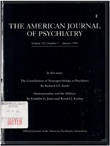Cognitive remediation in schizophrenia: is it time yet?
Abstract
Considerable effort has been directed toward identifying and conceptualizing information-processing deficits in schizophrenia and other psychotic disorders. The impressive gains in this field have made meaningful contributions to our understanding of the etiology and course of these disorders. This article considers whether the time is ripe to move beyond identification of these deficits to remediation of them. This move is far from a simple matter; it requires careful attention to theoretical frameworks and to the criteria for selecting certain cognitive deficits, among many, for remediation. A sparse and somewhat dated literature suggests that certain types of cognitive remediation, at least when defined in a narrow sense, are feasible with schizophrenic patients. This literature can reasonably justify continuing investigations on a modest scale. Specific questions for further studies include the following. 1) Which cognitive models provide a framework to guide cognitive interventions? 2) Which specific functions or levels of information processing should be targeted by cognitive interventions? 3) Are cognitive interventions effective? 4) Does the remediation of basic cognitive deficits generalize? A major strength of this area of investigation is the testability of the questions. Several research designs are tentatively suggested.
Access content
To read the fulltext, please use one of the options below to sign in or purchase access.- Personal login
- Institutional Login
- Sign in via OpenAthens
- Register for access
-
Please login/register if you wish to pair your device and check access availability.
Not a subscriber?
PsychiatryOnline subscription options offer access to the DSM-5 library, books, journals, CME, and patient resources. This all-in-one virtual library provides psychiatrists and mental health professionals with key resources for diagnosis, treatment, research, and professional development.
Need more help? PsychiatryOnline Customer Service may be reached by emailing [email protected] or by calling 800-368-5777 (in the U.S.) or 703-907-7322 (outside the U.S.).



